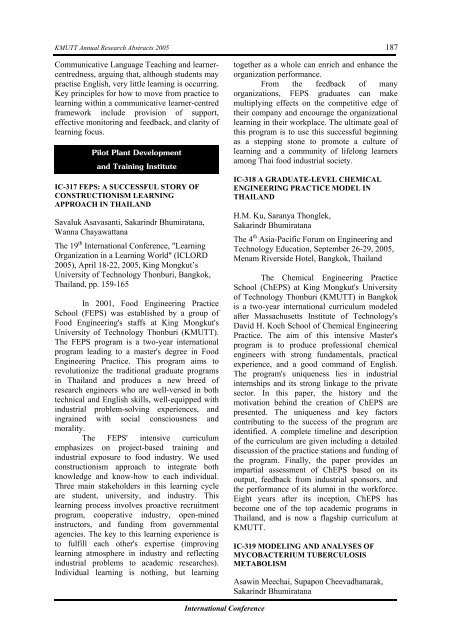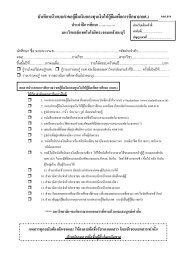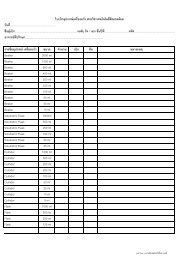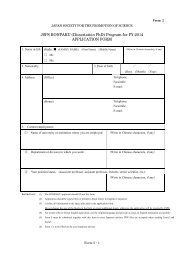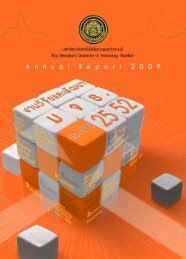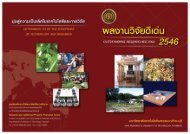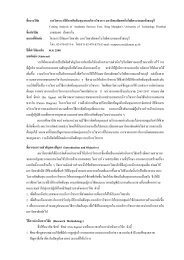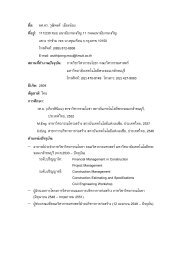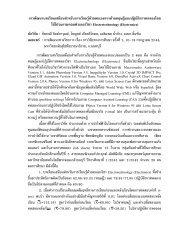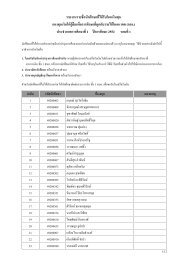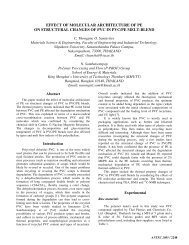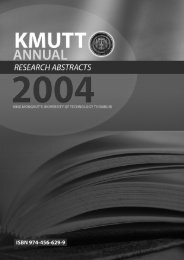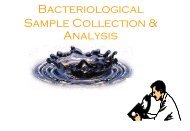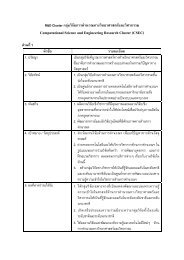You also want an ePaper? Increase the reach of your titles
YUMPU automatically turns print PDFs into web optimized ePapers that Google loves.
KMUTT Annual Research Abstracts 2005<br />
Communicative Language Teaching and learnercentredness,<br />
arguing that, although students may<br />
practise English, very little learning is occurring.<br />
Key principles for how to move from practice to<br />
learning within a communicative learner-centred<br />
framework include provision of support,<br />
effective monitoring and feedback, and clarity of<br />
learning focus.<br />
Pilot Plant Development<br />
and Training Institute<br />
IC-317 FEPS: A SUCCESSFUL STORY OF<br />
CONSTRUCTIONISM LEARNING<br />
APPROACH IN THAILAND<br />
Savaluk Asavasanti, Sakarindr Bhumiratana,<br />
Wanna Chayawattana<br />
The 19 th International Conference, "Learning<br />
Organization in a Learning World" (ICLORD<br />
2005), April 18-22, 2005, King Mongkut’s<br />
University of Technology Thonburi, Bangkok,<br />
Thailand, pp. 159-165<br />
In 2001, Food Engineering Practice<br />
School (FEPS) was established by a group of<br />
Food Engineering's staffs at King Mongkut's<br />
University of Technology Thonburi (KMUTT).<br />
The FEPS program is a two-year international<br />
program leading to a master's degree in Food<br />
Engineering Practice. This program aims to<br />
revolutionize the traditional graduate programs<br />
in Thailand and produces a new breed of<br />
research engineers who are well-versed in both<br />
technical and English skills, well-equipped with<br />
industrial problem-solving experiences, and<br />
ingrained with social consciousness and<br />
morality.<br />
The FEPS' intensive curriculum<br />
emphasizes on project-based training and<br />
industrial exposure to food industry. We used<br />
constructionism approach to integrate both<br />
knowledge and know-how to each individual.<br />
Three main stakeholders in this learning cycle<br />
are student, university, and industry. This<br />
learning process involves proactive recruitment<br />
program, cooperative industry, open-mined<br />
instructors, and funding from governmental<br />
agencies. The key to this learning experience is<br />
to fulfill each other's expertise (improving<br />
learning atmosphere in industry and reflecting<br />
industrial problems to academic researches).<br />
Individual learning is nothing, but learning<br />
187<br />
together as a whole can enrich and enhance the<br />
organization performance.<br />
From the feedback of many<br />
organizations, FEPS graduates can make<br />
multiplying effects on the competitive edge of<br />
their company and encourage the organizational<br />
learning in their workplace. The ultimate goal of<br />
this program is to use this successful beginning<br />
as a stepping stone to promote a culture of<br />
learning and a community of lifelong learners<br />
among Thai food industrial society.<br />
IC-318 A GRADUATE-LEVEL CHEMICAL<br />
ENGINEERING PRACTICE MODEL IN<br />
THAILAND<br />
H.M. Ku, Saranya Thonglek,<br />
Sakarindr Bhumiratana<br />
The 4 th Asia-Pacific Forum on Engineering and<br />
Technology Education, September 26-29, 2005,<br />
Menam Riverside Hotel, Bangkok, Thailand<br />
The Chemical Engineering Practice<br />
School (ChEPS) at King Mongkut's University<br />
of Technology Thonburi (KMUTT) in Bangkok<br />
is a two-year international curriculum modeled<br />
after Massachusetts Institute of Technology's<br />
David H. Koch School of Chemical Engineering<br />
Practice. The aim of this intensive Master's<br />
program is to produce professional chemical<br />
engineers with strong fundamentals, practical<br />
experience, and a good command of English.<br />
The program's uniqueness lies in industrial<br />
internships and its strong linkage to the private<br />
sector. In this paper, the history and the<br />
motivation behind the creation of ChEPS are<br />
presented. The uniqueness and key factors<br />
contributing to the success of the program are<br />
identified. A complete timeline and description<br />
of the curriculum are given including a detailed<br />
discussion of the practice stations and funding of<br />
the program. Finally, the paper provides an<br />
impartial assessment of ChEPS based on its<br />
output, feedback from industrial sponsors, and<br />
the performance of its alumni in the workforce.<br />
Eight years after its inception, ChEPS has<br />
become one of the top academic programs in<br />
Thailand, and is now a flagship curriculum at<br />
KMUTT.<br />
IC-319 MODELING AND ANALYSES OF<br />
MYCOBACTERIUM TUBERCULOSIS<br />
METABOLISM<br />
Asawin Meechai, Supapon Cheevadhanarak,<br />
Sakarindr Bhumiratana<br />
International Conference


